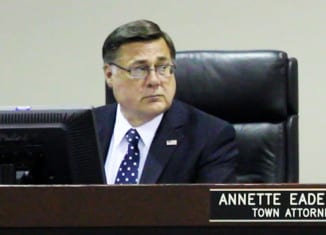Town proposes law to better track illegal rentals
Bill would limit cars allowed per bedroom
It’s a battle between the town and landlords as officials and concerned homeowners keep trying to combat illegal housing.
A proposed Brookhaven Town law aims to prevent overcrowding in rental homes by limiting the number of allowed tenants to four unrelated people — half as many as currently permitted — and restricting the number of permitted vehicles at a rental house to one car per legal bedroom plus one additional car. At a four-bedroom rental house, that translates to five allowed vehicles.
The proposal is the most recent in a string of initiatives to prevent illegal house rentals, including a measure that outlawed paving over front yards to make additional space to park cars.
“That’s how bad it was,” Supervisor Ed Romaine (R) said during last week’s Brookhaven Town Board meeting.
The housing issue came to the forefront a few years ago with the help of Bruce Sander, the president of Stony Brook Concerned Homeowners. In Three Village and neighboring areas like Port Jefferson and Middle Country, residents have spoken against illegal and often overcrowded rental homes that are filled with Stony Brook University students, citing quality of life issues such as noise and overflowing trash.
Romaine said the rules detailed in the proposed law would make it easier for the town to identify rental homes that house more people than legally allowed.
“There are a number of people who have taken over foreclosed houses for sale with four bedrooms,” Romaine said. “They’ve carved it up and put around eight to 10 students in them.”
Sander said students aren’t the issue — landlords are.
“The law department and town investigators are on top of this all the time because the landlord never obeys the laws,” Sander said in an interview, referring to landlords who rent houses to more tenants than legally allowed. “It’s just the nature of the beast; it’s just what they do.”
Sander helped found Stony Brook Concerned Homeowners around three years ago, after he moved to Stony Brook and identified two illegal boarding houses across the street from him. As the boarding houses became disruptive, residents in the area became concerned.
“I saw the value of my house and the value of my property just go down the tank.”
Tracking the number of people living in one rental home has been difficult for the town, but officials hope counting cars will make the process easier. The town’s overall goal is to provide legal housing for students without disrupting their neighbors.
“Stony Brook is a middle to upper-middle income,” Romaine said. “People moving in with their kids expect a certain quality of life.”
One member of the concerned homeowners group said at the town board meeting that he would like the town to focus on property upkeep as well.
“We’d like [the homes] to stay at a level of cleanliness and order that the community has around [the home],” the man said.
While rental housing and landlord issues are not as bad as they once were, Sander said there is more to be done.
“We still have a lot of work to do; these houses are in disrepair,” Sander said during the board meeting. “Some of these landlords just believe that they’re immune and that our group is going to go away. Well no, we’re growing. We have 1,400 to 1,500 homeowners that are standing strong against these illegal houses.”
The public hearing on the latest proposed law is set for Thursday, Oct. 1, at 6:30 p.m. at Town Hall in Farmingville.







